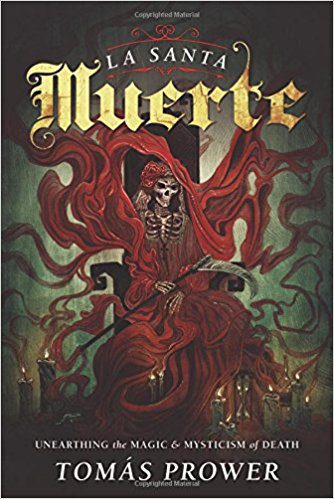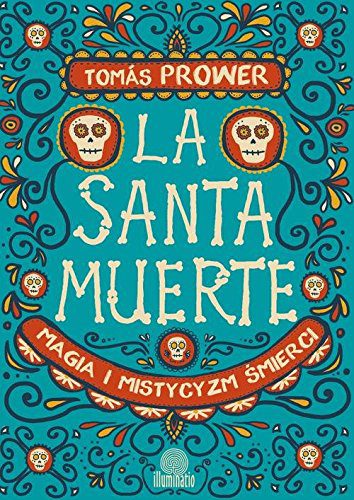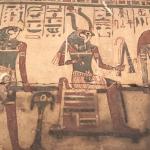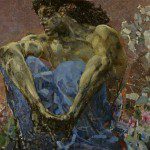A long-time studier of metaphysics, Tomás Prower, mastered the skill of communication through his previous work as a Liaison for the French Government and a director for the American Red Cross. Prower now travels the world as an author and lecturer, and he recently published a book exploring queer spirituality.
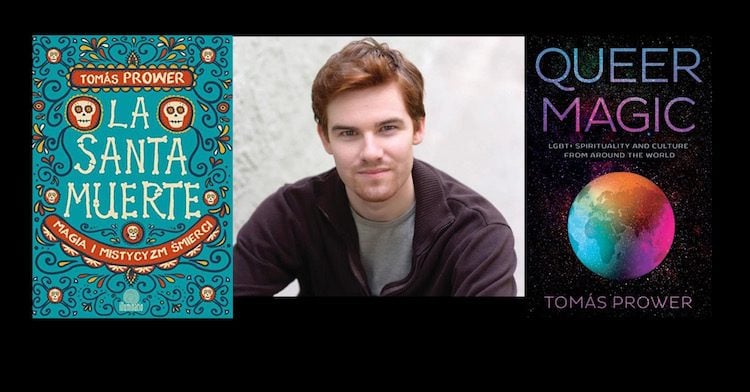
In Queer Magic, Prower tells histories of queerness in cultures throughout the world by documenting cultural traditions and mythologies considered to be queer. The book also includes specific rituals, prayers, meditations and spells related to queer deities from different eras. Prower believes that it is essential to cover all of these elements because of their interconnectedness. Cultural movements and socioeconomic standing affect the mythologies of a culture, which affects how they pray and what they pray about.
Power also included thematic takeaways from each civilization and words from individuals who live in said civilizations.
“An example of a somatic takeaway from a specific civilization would be the Kama Sutra of Hinduism in India,” Prower said. “It’s the most legendary sex book known to man (and still in print), but most people don’t know that it it also has in it descriptions and depicts same-sex love-making positions and even positions for transgender individuals”
It would be impossible for Prower to know the lived experience of individuals in traditional rural societies across the globe, so including the voices of those people is necessary for a work like “Queer Magic.” The rest of the information covered in the book Prower obtained through hours of research..
Prower explained that different cultures have different ideas of what qualifies as queer. In periods of ancient Japan and Greece, queer was a verb, Prower said. It was something people did, rather than something they saw as an aspect of identity. Prower then used the example of Lesotho, a country in Africa where sexual and romantic relationships between women are so ordinary that it isn’t considered queer.
It’s important to remember that many of the terms used today to describe queer people across the globe are western English words born of experiences unique to those places. In industrialized western societies, like the U.S., it becomes easy to label people around the world with terms like “gay,” “transgender” and “bisexual.” Different cultures are subject to varying perceptions of identity and gender; the word transgender is not a synonym with indigenous identities like Native American Two-Spirits.
Prower explained that in some Shamanic cultures people don’t label themselves, meaning that in those cultures no one could be defined as “queer,” “straight” or anything else.
“While all cultures use labels, since labels are necessary in distinguishing ‘this’ from ‘that’ in everyday life, the Chukchi people of eastern Siberia are good example of a culture whose shamans get their power from abstaining from labeling themselves,” Prower said. “In that way they can be nothing and everything at the same time, belonging nowhere yet everywhere in the universe.”
Prower said he believes that colonization has had an extremely negative impact on how people view queerness across the world. He pointed to Native Hawaiian culture, where being nonbinary was relatively common. After England invaded Hawaii the natives were forced to assimilate into white, Christian culture. A similar forced conversion oppressed enslaved Africans, many of whom came from pagan, and likely queer-friendly, cultures. Prower explained that in today’s era we see a reversal in acceptance of LGBTQ people on the world stage. As many European countries become open to LGBTQ acceptance, areas where people were taught conservative Christianity by their colonizers have forgotten their queer-accepting past and have adopted the homophobia of old Europe.
“Colonization often forces native people to adopt the so-called ‘civilized’ ways of their colonizers both in behavior and belief,” Prower said. “Because the heydays of European colonization occurred when Europe was conservative Christian, they imposed conservative Christianity to be the only worldview on the native peoples of foreign lands, regardless of their original queer acceptance or not.”
It seems the way cultures view queer people has to do with the nature of humanity itself. Prower explained that often the places that are most homophobic are rural, impoverished areas like the Middle East, the Caribbean and sub-Saharan Africa. Prower pointed to an age where Europe was financially bankrupt, defeated by plagues and war, and under the growing influence of an imperialistic Catholic church. In those days, queer people and pagans were systemically persecuted in Europe as they are now in places like Chechnya and Uganda. “You can’t look out for each other when you’re on survival mode constantly,” Prower said.
Europe isn’t the only place to shift its stance on queerness. Prower also mentioned the rise of queer mystic Rumi in ancient Persia, something that would seem impossible in modern-day Iran, which is violently anti-gay.
“Persia didn’t always love Rumi because Rumi was a Sufi, which has always been mocked and dejected by traditional branches of Islam,” Prower said. “Rumi’s saving grace was that not only did he write such great poetry, but he also wasn’t flaming gay. Like modern times, if you can entertain the oppressor and not be obvious about your differentness, you can get a pass in society.”
The lesson of queer persecution is similar to that of any oppression. Minorities become an easy scapegoat in time of political or economic unrest, and instead of blaming the rulers of nations and the elite, people are told to condemn those who are different than them. In any time of persecution, humanity must ask: Who has the power, and how do they benefit from narratives that scapegoat innocent people?
Power also brought up ancient Christianity. He said when the religion was first growing, like most religions, it didn’t have the luxury to turn anyone away. Christianity needed queer and pagan people to convert to help build the faith. As the church established itself, it’s membership became more exclusive, and at the height of its political power, the Catholic church persecuted millions of queer and pagan people.
Prower said he believes that queer people are most underrepresented in the religions of Christianity, Judaism, and Islam due to the erasure of queer history in those religions. Pagan and polytheistic cultures seem to have been more open with their past of queerness.
It’s mostly about literal interpretations of holy scripture; those denominations of those faiths that take holy scripture literally are more inclined to deny a queer past, while those who don’t take it literally accept their queer histories,” Prower said.
Prower concluded that queerness is more celebrated in the Pagan faith than most others. In modern times, many people convert to Paganism because of the dogmatic and sometimes anti-queer nature of mainstream monotheistic religions. Paganism gives these people a voice by celebrating them as divine, by allowing them to directly work with divinity and use magic for self-empowerment. Because of this and the diverse nature of Paganism, the religion often seems to attract marginalized voices.
Prower described his beliefs as similar to Taoism, believing in rejecting the adherence of labels. Prower said that when people try to define God as one thing, it automatically means that all other things are not God. He believes labels are problematic in this way, as it becomes easy for humanity to lose ourselves in titles that can create hierarchies.
Prower has a personal relationship with La Santa Muerte, the Mexican folk goddess of death. Prower explained that death does not discriminate; thus the goddess is naturally non-judgemental and willing to help LGBTQ people.
Prower said he admires queer deities like Athena and Vishnu, two deities that many people would argue are far from queer. While these deities aren’t historically labeled with terms like “lesbian” or “asexual,” that doesn’t mean they aren’t queer. They are beings from cultures where such words didn’t even exist; people may not have ever thought to analyze them under a queer lens.
Prower said that Athena, the Greek goddess of wisdom, is feminine but always sides with men in myths of the time. He also noted that her devotees had to be virgins, and believes Athena could be Asexual or Nonbinary.
Vishnu is a Hindu god who Prower said gets his power from having loving interactions with people. Since Vishnu loves everyone, he could be labeled as Pansexual. Of course, he has never been classified as such, because the word Pansexual has only existed for a fraction of the God’s history.
Prower found striking similarities in the cultures he studied. He said that lots of prayer and magic are about trying to attain protection, love and financial security. Human needs are the same across cultures, and the only difference with queer magic is that it involves LGBTQ people or deities.
In harsh political climates it may become easy to blame an entire group or ideology for the existence of homophobia and transphobia, and while some have bloodier hands than others, anti-queer sentiment has existed in every form of humanity. Just as queer people live in every culture and religion, so does anti-queer ideology.
For queer people being forced to endure these harmful ideologies, Prower offers advice:
“Don’t take anything too seriously,” Prower said. “Words can only hurt you if you believe them to be true. For example, if I said the Queen of the 7th moon of Venus hates you for your queerness, you would not be offended because you don’t believe it to be true since it’s so ridiculous. So when someone says that the Supreme God in Heaven hates you for being queer, that only hurts you because you believe it’s true, but really, it’s just as ridiculous. Find your own truth, and it’s all just nonsense.”
In every culture and religion, queer people are a minority, and it is imperative that we work across religious and national barriers to create a world where everyone can exist freely. We can do this by educating ourselves about other cultures, and by using technology and communication to uplift queer voices across the world.
“The Internet helps minorities organize and build community since you can hide behind the anonymity of an avatar or a made-up name,” Prower said. “You don’t have to run the glorious risk of being publicly out (which is the most effective and powerful thing you can do), but you can still help the communities through organization, donating money, hacking the computers of the enemies who dare oppress any one of us, and other fun stuff like that without anyone knowing who you are and no personal repercussions.”
For those looking to incorporate their queer identity into their spiritual path, Prower recommends researching queer histories in cultures and geographical areas that you are already passionate about.
Photo of Tomás Prower by Ray Garcia Photography, courtesy of Llewellyn Publications. You can follow Tomás Prower on Facebook.



